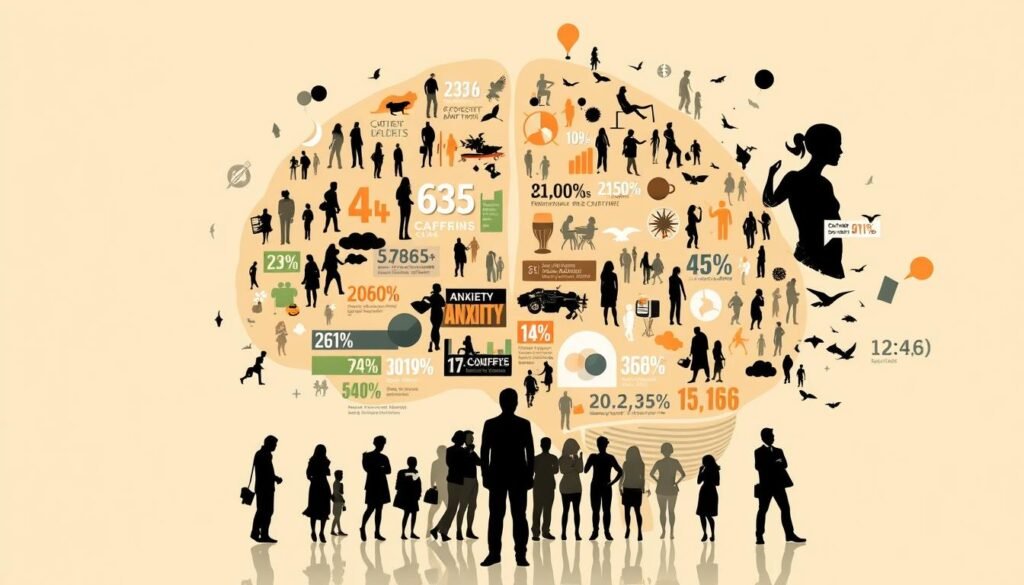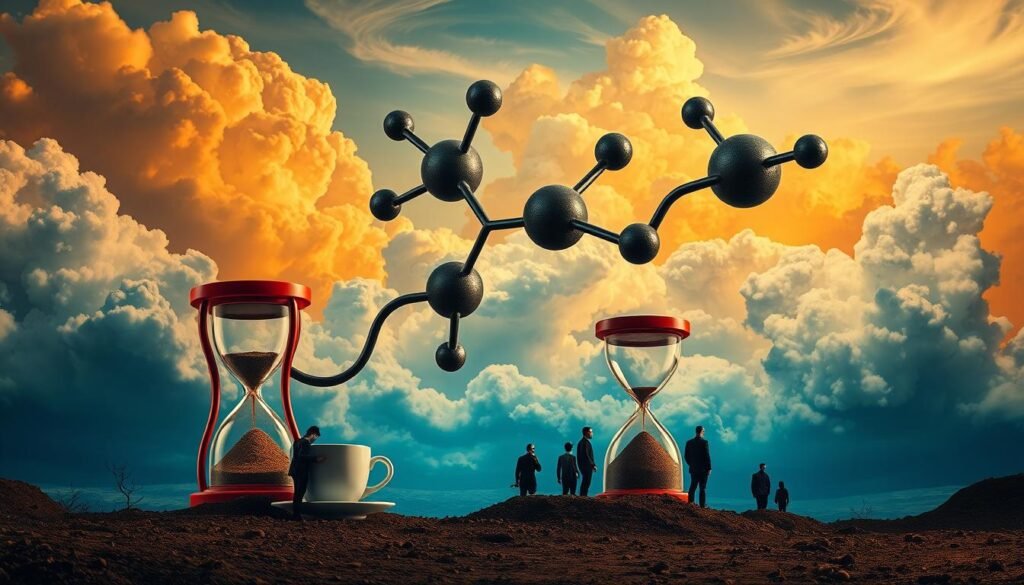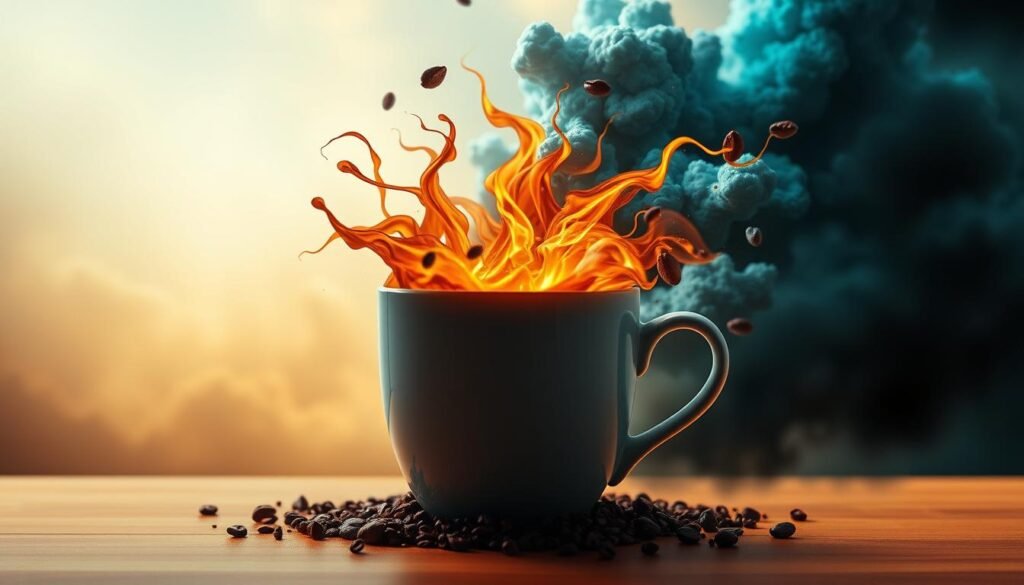Did you know that almost 85% of U.S. adults have caffeine every day? They consume about 135 milligrams, which is like one coffee cup. While many love caffeine for boosting alertness and thinking skills, its effect on anxiety over time is getting more attention. Research is showing a complex link between caffeine use and anxiety levels. This is especially true for people with anxiety disorders.
In fact, studies show that caffeine made 51.1% of patients have panic attacks. This is a big difference from those who didn’t have caffeine. This article will explore how regular caffeine use impacts anxiety in various groups. We aim to offer a deeper insight into its role in our mental health.
Key Takeaways
- About 85% of U.S. adults consume caffeine regularly.
- Caffeine may have both beneficial and detrimental effects on anxiety levels.
- Panic attacks are more prevalent in individuals with anxiety disorders following caffeine consumption.
- Consuming over 400 mg of caffeine can heighten anxiety risk.
- Understanding the relationship between caffeine and anxiety can aid in better mental health management strategies.
Understanding Caffeine and Its Role in Mental Health
Caffeine is a popular stimulant found in coffee, tea, and energy drinks. It has a big impact on mental health. This has led to increased interest in how caffeine affects anxiety disorders. Studies show that about 73% of
What Is Caffeine and How Does It Work?
Caffeine is a known stimulant found in coffee, tea, and some energy drinks. People like it because it helps them think better and gives a quick energy lift. It works by blocking adenosine receptors in the brain, which usually make us relaxed and sleepy. This action makes the brain release more norepinephrine and dopamine, which makes us more alert and focused.
However, drinking too much caffeine, over 400 milligrams daily, can be harmful. For those who are sensitive, it could lead to anxiety and panic attacks. The U.S. Food & Drug Administration says this sensitivity makes the heart beat faster and can make someone feel restless. This issue is so significant that it’s listed as caffeine-induced anxiety disorder in the DSM-5 Diagnostic Manual of Mental Disorders.
A 2013 study in the Journal of Caffeine Research shows caffeine is the most used psychoactive substance worldwide. It has a big role in today’s society. For people sensitive to caffeine, it stays longer in their body, making the effects last longer and possibly causing anxiety.
| Source | Caffeine Content (mg/Fluid Ounce) |
|---|---|
| Regular Coffee | 4 – 21 |
| Espresso | 47 – 63 |
| Carbonated Soft Drinks | 2 – 7 |
| Tea | 1 – 8 |
| Energy Drinks | 3 – 20 |
| Energy Shots | 40 – 70 |
Knowing how caffeine works is very useful. It can make us more awake. But, we need to use it wisely, especially if it causes anxiety for some.
Defining Anxiety Disorders and Their Prevalence
Anxiety disorders consist of mental health issues with excessive fear and worry. They majorly disrupt daily life, affecting various areas. There are over 40 million adults in the U.S. affected. This represents about 19.1% of adults suffering from some kind of anxiety disorder. The global impact is significant, too, with approximately 264 million people involved, as reported by the World Health Organization.
Children also face anxiety, with 7% of them aged 3-17 experiencing it yearly. Symptoms often start before the age of 21. Anxiety disorders include conditions like Generalized Anxiety Disorder (GAD), Panic Disorder, and different phobias. Common symptoms are panic attacks, sleep issues, stomach problems, and trouble focusing.
Risk factors for anxiety disorders include past trauma and family history. But, only 36.9% of those in need get proper treatment. Treatments like Cognitive Behavioral Therapy (CBT) and medication are used to help with symptoms.

Knowing how widespread anxiety disorders are helps in tackling mental health needs. Greater awareness can improve screening and treatment for those affected.
Long-term Effects of Caffeine on Anxiety
The relationship between caffeine and anxiety is important to study. Research shows that using caffeine a lot can make anxiety worse. This is especially true for people who already struggle with anxiety disorders. Knowing how caffeine affects them is key for those who want to keep their mental health in check.
Overview of Research Findings
Studies show that having more than 400 mg of caffeine a day can make anxiety and panic attacks more likely. In the general population, there’s a clear link between how much caffeine people drink and their anxiety levels. This connection has a standardized mean difference (SMD) of 0.94. Also, about 0.002% of people get caffeine-induced anxiety disorder every year. This condition causes panic attacks because of caffeine and doesn’t happen unless someone drinks caffeine.
Impact on Healthy Individuals vs. Those with Anxiety Disorders
People without anxiety disorders might see mild anxiety or feel restless if they have too much caffeine. But, those with anxiety disorders are more affected by caffeine. They often have panic attacks after having caffeine. This shows a big difference in how caffeine impacts people, depending on their mental health. So, knowing how sensitive you are to caffeine is essential for making smart choices about drinking it.

| Population | Caffeine Intake Level | Risk of Anxiety Symptoms |
|---|---|---|
| General Population | Over 400 mg per day | Increased |
| Individuals with Anxiety Disorders | Any caffeine intake | Higher Risk of Panic Attacks |
| Healthy Individuals | High Caffeine Consumption | Potential Anxiety Symptoms |
For more information on how caffeine impacts your mental health, check out this article about caffeine and anxiety.
The Relationship Between Caffeine Consumption and Anxiety Symptoms
The link between drinking caffeine and feeling anxious has gotten a lot of focus. This is due to caffeine’s huge popularity in the United States. About 85% of U.S. citizens have caffeine every day. Many don’t think about how it might affect their mental health. Although caffeine can make you feel more alert at first, drinking it a lot might actually make anxiety symptoms worse.
Short-term vs. Long-term Effects
Caffeine can make you feel sharper for a short time. This might make people ignore the possible dangers. But studies have shown a concerning link between lots of caffeine and anxiety problems. A 2008 study found that high amounts of caffeine could cause symptoms similar to anxiety disorders. Too much caffeine can make it seem like you have a psychiatric condition. This shows why it’s important to not overdo it.
Many popular drinks have very different amounts of caffeine:
- Decaf coffee: 3–12 mg per 8 oz
- Plain black coffee: 102–200 mg per 8 oz
- Espresso: 240–720 mg per 8 oz
- Black tea: 25–110 mg per 8 oz
- Green tea: 30–50 mg per 8 oz
- Yerba mate: 65–130 mg per 8 oz
- Soda: 37–55 mg per 12 oz
- Energy drinks: 107–120 mg per 12 oz
The FDA says adults should only have up to 400 mg of caffeine each day. Going over this limit can be harmful and even cause seizures. Studies have found that people with panic disorders might react badly to caffeine. For example, 51.1% of those affected had a panic attack after having caffeine. This did not happen with a placebo. This shows that people with these disorders might be more sensitive to caffeine’s effects.
The complex relationship between drinking caffeine and feeling anxious needs careful thought. This is especially true for people prone to mental health issues. Balancing caffeine and health is crucial. For more details on this topic, check out this comprehensive study.

The Impact of Coffee on Anxiety Levels
Coffee is a key part of daily life in many cultures. It boosts energy quickly. But, the effect of coffee on anxiety is not the same for everyone. Knowing how various caffeinated drinks impact anxiety is crucial. This helps in choosing how much caffeine to drink wisely.
Different Types of Caffeinated Beverages
There are many caffeinated drinks, each with different caffeine levels. Each one impacts anxiety in its own way. Below, you’ll find a list of common caffeinated drinks and their caffeine amounts:
| Caffeinated Drink | Caffeine Content (mg) |
|---|---|
| Starbucks Grande Coffee (16oz) | 310 |
| Bang Energy Drink (16oz) | 300 |
| Red Bull (12oz) | 114 |
| Brewed Coffee (8oz) | 85 |
| Single Espresso Shot | 64 |
| Energy Shot | 350 |
Research shows that 300 mg of caffeine can make stress levels go up a lot compared to a fake pill. People who have more than 1,000 mg a day often feel shaky or nervous. It’s important to know this so you can control how much you drink. This way, you can avoid the anxiety that comes with too much of certain caffeinated beverages.
Caffeine Sensitivity and Anxiety Response
People react differently to caffeine, and it’s often due to genetics. While some can enjoy up to four cups of coffee without issues, others might feel anxious or shaky after just two. It’s important to know how much caffeine you can handle.
High caffeine can cause anxiety, restlessness, fast heartbeat, and sleep problems. Your age, genes, gender, body clock, and sleep habits can affect this. Pregnant women should watch their caffeine to avoid harm to the baby.
Kids and teens should stay away from caffeine to protect their growing brains. It can make them more anxious and affect their mood and actions later on.
As we get older, caffeine may disrupt our sleep more, even in small amounts. This can happen despite no big change in how our bodies handle caffeine. Checking out insights on caffeine sensitivity helps us manage our intake better.
Managing Caffeine Intake to Reduce Anxiety
Managing your caffeine is key if you struggle with anxiety. Cutting back on caffeine can greatly improve how you feel. Watching how much caffeine you drink, especially in stress-heavy times, is wise. Too much caffeine, like over 400 milligrams daily, can make anxiety worse.
To ease anxiety, try lowering your caffeine slowly. This method prevents withdrawal symptoms. You can also switch to drinks with little or no caffeine, like herbal teas. These options keep your drink routine but lessen anxiety.
Keeping a journal to note how caffeine affects your moods can be enlightening. It helps you see how caffeine and anxiety link for you. Plus, doing things like deep breathing or meditation can calm you down, fighting off anxiety.
- Light exercise can also help break down caffeine faster, easing anxiety symptoms.
- Drinking plenty of water helps reduce the negative effects of caffeine.
- Eating foods rich in protein and complex carbs is good for your mind and energy levels.
Following tips to cut down on caffeine can lower your anxiety. These steps don’t just help with caffeine. They also lead to a balanced life that caters to your personal needs.
Alternative Strategies for Anxiety Management
Dealing with anxiety can be tough, especially if caffeine has made it worse. There are many anxiety management strategies to help improve mental health. These include therapy, staying mindful, and exercising regularly.
Therapy like Cognitive Behavioral Therapy (CBT) offers great coping mechanisms for anxiety. It helps people recognize and change negative thoughts. Being mindful, focusing on the present, can also lower anxiety.
What you eat matters too. A study in 2021 showed that good nutrition helps prevent depression and anxiety. Drinking enough water, about 6 to 8 glasses daily, is also key. It supports your body’s functions and eases stress.
Exercise is super helpful for managing anxiety. Doing aerobic exercises for 2½ hours a week can make a big difference. High-intensity workouts can be even more effective. Even daily walks for 15-20 minutes are beneficial in the long run.
Here’s a short list of some effective strategies:
| Strategy | Description |
|---|---|
| Cognitive Behavioral Therapy (CBT) | Changes negative thoughts to ease anxiety. |
| Mindfulness | Helps focus on the present, reducing anxiety. |
| Regular Exercise | Linked to big drops in anxiety levels. |
| Hydration | Enough water helps with bodily functions and stress. |
| Dietary Changes | Eating right can prevent anxiety and depression. |
Using various anxiety management strategies and coping mechanisms for anxiety lets people tailor their path. Getting advice from doctors can boost these efforts, leading to a healthier life. To learn more about effective treatments, click here.
Conclusion
Knowing how caffeine affects stress and anxiety over time is key for smart choices. A moderate amount, like 200 mg or about two cups of coffee, boosts alertness. But, it might make some feel more nervous or jittery, especially if they’re easily affected by caffeine. This shows how complex caffeine’s effects on mental health are, pointing out how important it is to know how it affects you personally.
Studies show caffeine and higher anxiety levels are linked, especially in those already dealing with anxiety issues. It’s important to keep an eye on how much caffeine you drink. Cutting down slowly, maybe by skipping one cup a day, helps avoid withdrawal symptoms and supports better mental health. Trying herbal teas can also be a good way to manage anxiety without caffeine’s negative sides.
Being mindful about caffeine and its impact on mental health helps people make better choices. The key to improved mental health is balancing intake, understanding your own reactions to caffeine, and sticking to amounts that are good for your health. This approach helps improve overall well-being and life quality.